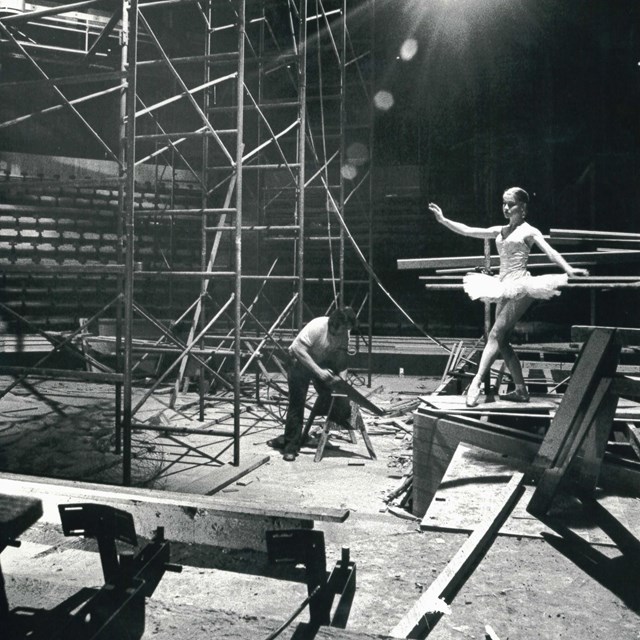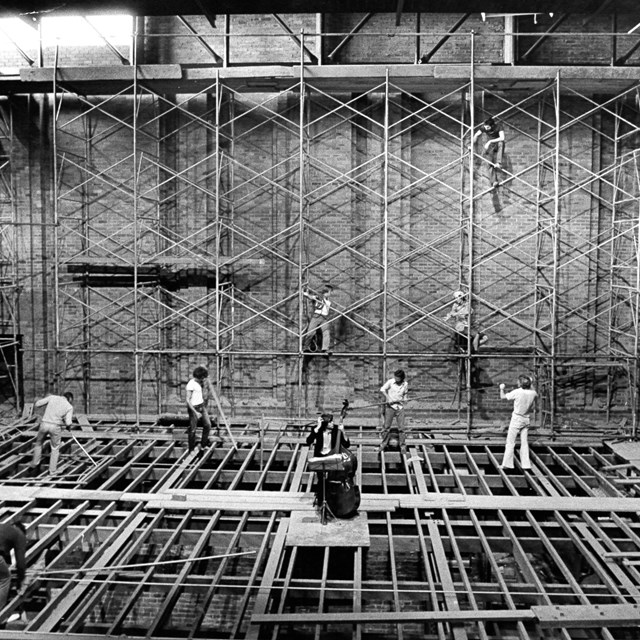All about Arts Education
Arts Education has always been core to Seymour Centre's work.
Everest Reginald York Seymour, the Sydney businessman and philanthropist whose generous bequest enabled the building’s construction, requested that the new venue be used for "the cultivation, education and performance" of dramatic arts, and this clear vision has guided us since day one.
Our early initiatives
In 1978 the Seymour appointed its first education officer, Sue Sanders, to enrich the experience of young Seymour visitors.
Beyond schools performances and playwright talks, early education activities included backstage tours and opportunities to watch rehearsals, plus workshops on movement, dance, acrobatics, and improvisation.
There were even courses run by NSW Theatre of the Deaf, now Australian Theatre of the Deaf, to teach children the nuances of non-verbal communication.
Education through theatre
Early in its history the Seymour also began engaging educational theatre providers as resident companies—a tradition that continues today.
During the 1970s, one such company was Robert Love’s Toe Truck Theatre, which brought the curriculum to life for countless students through productions of classic Australian texts like Norm and Ahmed and Hating Alison Ashley.
Toe Truck also presented plays on topics as diverse as the migrant experience and the arms race, all designed to spark classroom discussion.
A home for young creatives
The Seymour has also housed not one but two youth theatre companies in its time.
Devised by young people, for young people, City Road Youth Theatre ran acting workshops and writing courses with acclaimed playwrights like Alex Buzo.
Seymour Student Theatre, meanwhile, was Australia’s first national theatre company for tertiary students, gathering the country’s brightest young creatives every two years for an intensive period of training, rehearsal, and performance akin to life in a professional company.
Many student productions, like 1976’s Spring Awakening or 1982’s The Good Person of Setzuan, played to packed houses.
An abiding commitment
The Seymour’s commitment to Arts Education remains steadfast.
Today, we drive youth engagement through a comprehensive program of plays for primary and secondary students—many presented by our outstanding resident companies, Sport for Jove and Shaun Parker & Company—and we proudly foster the next generation of artists through hosting the State Dance and State Drama Festivals each year.
We even have a network of teachers who help shape our programming—because Arts Education is vital, and the more passionate people involved, the better.
Pictured:
- Outpost by Toe Truck Theatre, 1979
- City Road Youth Theatre participants, 1979
- Attendee of Sydney Youth Theatre Festival, 1985
20 September 2021
AusStage
Education: Journal of the NSW Public School Teachers Federation:
Vol. 59, no. 5
Vol. 59, no. 11
Vol. 66, no. 19
Tharunka:
Vol. 22, no. 1
Vol. 27, no. 11
From outstanding theatre, music and dance to innovative shows for kids, you’ll find something for everyone at the Seymour. Click below to see what’s on.
See what's onArts Education has always been core to Seymour Centre's work.
Everest Reginald York Seymour, the Sydney businessman and philanthropist whose generous bequest enabled the building’s construction, requested that the new venue be used for "the cultivation, education and performance" of dramatic arts, and this clear vision has guided us since day one.
Our early initiatives
In 1978 the Seymour appointed its first education officer, Sue Sanders, to enrich the experience of young Seymour visitors.
Beyond schools performances and playwright talks, early education activities included backstage tours and opportunities to watch rehearsals, plus workshops on movement, dance, acrobatics, and improvisation.
There were even courses run by NSW Theatre of the Deaf, now Australian Theatre of the Deaf, to teach children the nuances of non-verbal communication.
Education through theatre
Early in its history the Seymour also began engaging educational theatre providers as resident companies—a tradition that continues today.
During the 1970s, one such company was Robert Love’s Toe Truck Theatre, which brought the curriculum to life for countless students through productions of classic Australian texts like Norm and Ahmed and Hating Alison Ashley.
Toe Truck also presented plays on topics as diverse as the migrant experience and the arms race, all designed to spark classroom discussion.
A home for young creatives
The Seymour has also housed not one but two youth theatre companies in its time.
Devised by young people, for young people, City Road Youth Theatre ran acting workshops and writing courses with acclaimed playwrights like Alex Buzo.
Seymour Student Theatre, meanwhile, was Australia’s first national theatre company for tertiary students, gathering the country’s brightest young creatives every two years for an intensive period of training, rehearsal, and performance akin to life in a professional company.
Many student productions, like 1976’s Spring Awakening or 1982’s The Good Person of Setzuan, played to packed houses.
An abiding commitment
The Seymour’s commitment to Arts Education remains steadfast.
Today, we drive youth engagement through a comprehensive program of plays for primary and secondary students—many presented by our outstanding resident companies, Sport for Jove and Shaun Parker & Company—and we proudly foster the next generation of artists through hosting the State Dance and State Drama Festivals each year.
We even have a network of teachers who help shape our programming—because Arts Education is vital, and the more passionate people involved, the better.
Pictured:
- Outpost by Toe Truck Theatre, 1979
- City Road Youth Theatre participants, 1979
- Attendee of Sydney Youth Theatre Festival, 1985
20 September 2021
AusStage
Education: Journal of the NSW Public School Teachers Federation:
Vol. 59, no. 5
Vol. 59, no. 11
Vol. 66, no. 19
Tharunka:
Vol. 22, no. 1
Vol. 27, no. 11
From outstanding theatre, music and dance to innovative shows for kids, you’ll find something for everyone at the Seymour. Click below to see what’s on.
See what's on





